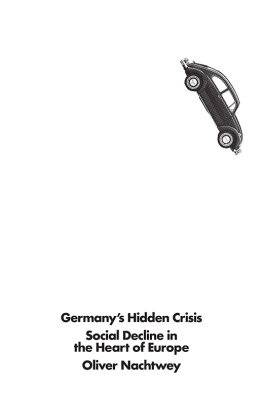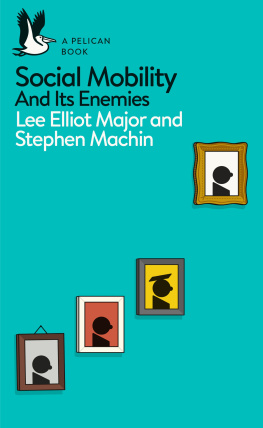Contents

GERMANYS HIDDEN CRISIS
GERMANYS HIDDEN CRISIS
SOCIAL DECLINE IN THE HEART OF EUROPE
OLIVER NACHTWEY
Translated by David Fernbach and Loren Balhorn

The translation of this work was funded by Geisteswissenschaften InternationalTranslation Funding for Humanities and Social Sciences from Germany, a joint initiative of the Fritz Thyssen Foundation, the German Federal Foreign Office, the collecting society VG WORT and the Brsenverein des Deutschen Buchhandels (German Publishers and Booksellers Association)
First published in English by Verso 2018
First published as Die Abstiegsgesellschaft. ber das
Aufbegehren in der regressiven Moderne
Suhrkamp 2016
Translation David Fernbach and Loren Balhorn 2018
All rights reserved
The moral rights of the author have been asserted
1 3 5 7 9 10 8 6 4 2
Verso
UK: 6 Meard Street, London W1F 0EG
US: 20 Jay Street, Suite 1010, Brooklyn, NY 11201
versobooks.com
Verso is the imprint of New Left Books
ISBN-13: 978-1-78663-634-8
ISBN-13: 978-1-78663-714-7 (HB)
ISBN-13: 978-1-78663-636-2 (US EBK)
ISBN-13: 978-1-78663-635-5 (UK EBK)
British Library Cataloguing in Publication Data
A catalogue record for this book is available from the British Library
Library of Congress Cataloging-in-Publication Data
Names: Nachtwey, Oliver, author.
Title: Germanys hidden crisis : social decline in the heart of Europe / Oliver Nachtwey ; translated by David Fernbach.
Other titles: Abstiegsgesellschaft. English
Description: Brooklyn : Verso, 2018.
Identifiers: LCCN 2018028796I ISBN 9781786636348 (paperback) | ISBN 9781786637147 (hardback) | ISBN 9781786636362 (United States E Book) | ISBN 9781786636355 (United Kingdom E Book)
Subjects: LCSH: Social change. | Social mobility. | Social conflict. | Capitalism. | BISAC: POLITICAL SCIENCE / History & Theory. | HISTORY / Europe / Germany.
Classification: LCC HM831 .N3313 2018 | DDC 303.4dc23
LC record available at https://lccn.loc.gov/2018028796
Typeset in Minion Pro by Hewer Text UK Ltd, Edinburgh
Printed and bound by CPI Group (UK) Ltd, Croydon, CR0 4YY
Contents
Afterword:
The Crumbling Pillars of Political Stability
Asked about their professional goals in 2014, a third of all German university students answered that they were looking for a secure position in government servicemore than anything, they were seeking stability and security. New, path-breaking occupations, risky start-ups and independent creative activity have lost their attractiveness for many students. Government service, on the other hand, seems to them one of the few areas in which stable employment, security and a predictable social ascent can be expected. This practically bourgeois occupational perspective of young graduates represents only a small cross-section of a society in which collective fear of downward mobility seems to be universal. How did this come about?
Historical memory is often short, and only few of us remember that as recently as 1999, the German economy was still seen as the sick man of the euro; back then the unemployment rate was climbing ever higher. Today the reality looks very different. All over Europe, unemployment is at record levels; in Germany, on the other hand, there have never been so many people in work as in 2016, and never so few unemployed since reunification. While other European states have been mired in a welter of austerity and economic crisis, the German economy has apparently bucked this trend. This is little more than a pleasant as the other European countries.
In this book, I use the example of German development to demonstrate a fundamental social change currently underway in most Western capitalist states. Societies of ascent and social integration, I argue, have become societies of downward mobility, precariousness and polarization.
Since the post-war economic miracle, Germany has been seen as a country in which poverty plays only a marginal role. Given the euphoria about the new full employment that is proclaimed in books and newspaper articles, it is all too easy to overlook how great social inequality has become in the country, how strongly the low-wage sector has grown and precariousness has increased. Beneath the surface of a seemingly stable society, the pillars of social integration have long been eroding, while ruin and relegation are spreading.
Literature is a sensitive seismograph for this change, and yearnings for social progress have always found expression in it. Ulla Hahn, in her fictional trilogy of the life of Hildegard (Hilla) Palm, Das verborgene Wort (2001), Aufbruch (2009) and Spiel der Zeit (2014), depicts in fine detail the social mores of an upwardly mobile society in the decades after the Second World War. Her protagonist combines a love of literature with the quest for a self-determined life. Hilla is exceptionally gifted, completes secondary school andunusually for a kid from the proletariat, and a country girl at thatgoes on to university. She experiences both the crude and finer distinctions between herself and the class whose sons, even if untalented, regularly end up in dominant social positions. Though her own family unambitiously persists in its simple ways, education grants her an upward mobility that is characteristic of her time.
When literature addresses our social present, on the other hand, it depicts stories of disaster, uncertainty, downward mobility and ruin. In the autobiographical novel Mbelhaus (2015), the former journalist who writes under the pseudonym of Robert Kisch recapitulates his own decline from talented writer to furniture salesman. This is the story of a long downward slide, perhaps unique in this particular form. But it attests to the transformation of a whole branch of employment that only a few years ago promised professional prestige, autonomous activity and a good income. This world of journalism no longer existsor only for a few, if at all. Mbelhaus is not the only example. In her reportage Saisonarbeit (2014), Heike Geissler relates how she could no longer live from her writing and found herself forced to work as a packer in an Amazon warehouse. Thomas Melle gives a similar account in his novel of the underclass, 3000 Euro (2014). The story of slipping out of security can also be read in Katharina Hackers Die Habenichtse (2006), Ernst-Wilhelm Hndlers Wenn wir sterben (2002), Rainald Goetzs Johann Holtrop (2012), Wilhelm Genazinos Fremde Kmpfe (1984) and Mittelmssiges Heimweh (2007), Georg M. Oswalds Alles was zhlt (2000) and Silke Scheuermanns Die Huser der anderen (2012).
Literature is not a social diagnosis, but nonetheless it often depicts much that is true about the reality that I aim to discuss here from a scientific perspective.
This book attempts to explore certain classical questions of sociology: What kind of society do we live in? What holds groups and individuals together, and what drives them apart? What is the connection between inequality, domination, social integration and social conflict? Many of the arguments that I present here in the spirit of sociological exploration are in a certain sense risky, since in some areas they still lack empirical confirmation. And as they are essentially developed from the example of a single nation state, international and transnational aspects will only be touched on in passing (for example, at the end of the





